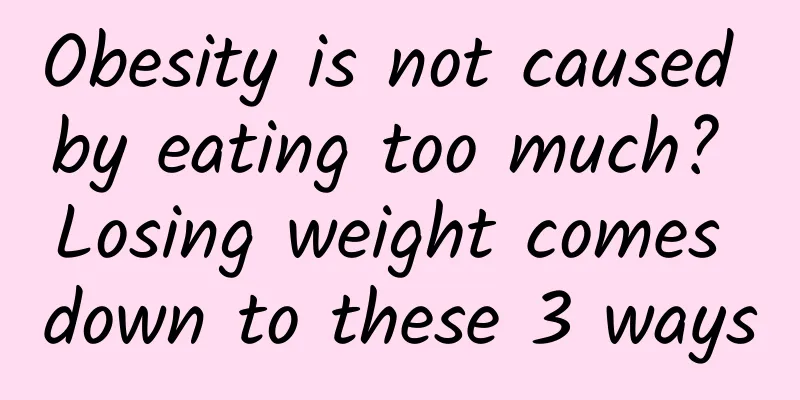Obesity is not caused by eating too much? Losing weight comes down to these 3 ways

|
After trying to lose weight many times, many people may not have seriously thought about this question: What exactly causes obesity? Most people would probably say: I just ate too much! But why do others not gain weight even though they eat a lot, but you gain weight even though you don’t eat much? Therefore, there are many factors that influence whether you are fat or thin. It is not as simple as looking at the amount of food on the plate. Even if we strictly define fat and thin, ignore the influence of the skeleton, and only consider whether body fat exceeds the standard, the problem is still complicated. First of all, the genetic factors are different. There is no way to compare... Secondly, the body's metabolic rate is different. This is related to muscle mass and physical condition. Active and energetic people have a high metabolic rate and are less likely to gain fat under the same diet; people who are heavy and easily fatigued have a slow metabolism and are more likely to gain fat under the same conditions. In addition, the content of food is also different. Even if the calories are the same, a diet with a comprehensive supply of nutrients is not easy to gain weight. For example, the Mediterranean diet and DASH diet, which are highly recommended by various countries, are not easy to gain weight in the long run. Of course, the amount of physical activity also needs to be taken into account. Not just occupational activities and sports exercises, but also the total physical activity during the day, including commuting methods, household chores, hobbies, etc. Even when all these factors are taken into account, people are sometimes confused by the fact that dietary calories cannot fully explain weight changes. For example, some ladies found that they ate more than before after following my diet, and they were full at every meal, but they actually lost weight! Why is that? In fact, there are two main theories about the causes of weight loss and weight gain (Ludwig DS, AJCN, 2021), each of which has some experimental evidence. For those who don’t have the patience to understand the scientific content, you can look at the highlighted fonts and the suggestions at the end of the article. The traditional theory is the "energy balance" theory. It believes that the increase in body fat is caused by a positive energy balance. If you eat more and move less, or your metabolic rate decreases for various reasons but your food intake does not decrease, the energy intake from food is greater than the energy consumed by the body, and body fat will increase. This theory has been supported for many years because it is simple and clear, and is well known to the public. Scholars who support it believe that in today's society, food has become more delicious, while housework and work physical activities consume less energy, so people can't help but eat more and move less, resulting in a positive energy balance (intake is greater than output), so they gain weight. Eating less + exercising can solve this problem. From a historical perspective, traditional theories can basically explain the weight status of the general public. From the ancients thousands of years ago, to the revolutionary war era, and even the poverty era decades ago, the amount of physical activity was much greater than it is now. At that time, transportation basically relied on walking, and work basically relied on hands, so there was no need to control diet, and the diet was mainly carbohydrates, so fat people were rare. Even in today's society, there are indeed many people who have successfully lost weight and even maintained a healthy body shape by controlling their diet and increasing exercise. Look at those beautiful rhythmic gymnasts and beauties from all over the world who participate in beauty pageants. They all rely on hard exercise and scientific diet to ensure their perfect body shape. Another is the "blood sugar regulation" theory, which believes that high blood sugar after a meal leads to excessive insulin secretion, and excessive insulin secretion inhibits fat decomposition and promotes fat synthesis, thus gradually causing obesity. The second theory is currently quite popular, which attributes the culprit of weight gain to fast-digesting carbohydrates, that is, sugar and refined starch. It is also used as the theoretical basis by many people who promote low-carbohydrate diets. Indeed, many people have found that they lose weight and feel less sleepy after eating less staple food. Some people have also found that their blood lipid levels drop after reducing refined white carbohydrate foods. Both statements seem to make sense and both have supporters, but also opponents. Many people have found that eating less makes them hungry, and exercising doesn’t necessarily help them lose weight. Some have found that eating less staple food causes them to lose muscle and their brains don’t work as well. Supporters of the blood sugar regulation theory have tried to use various research evidence to prove that the energy balance theory is wrong. They say that high-calorie, delicious food can only cause a short-term increase in appetite; in the long run, the appetite will adapt to it and will not maintain a large appetite. Indeed, in modern society, people's overall appetite is much less than it was decades ago. In the past, people ate from large bowls, but now they eat from small bowls. On the contrary, some studies have found that people or experimental animals will adapt to unpalatable food and even eat more if they only eat this food. Therefore, it is a wrong idea to lose weight by "eating unpalatable food" or "controlling dietary calories". They said that there are nutrition labels on foods to indicate energy levels, and health educators are constantly urging people to eat less and exercise more, but the obesity rate has not dropped as a result of these measures. They also said that people's daily food intake and activity levels are not exactly consistent, and the body will not feel a noticeable difference when the energy balance difference is within 300 kcal. However, the weight of most people can remain constant for a long time, which is difficult to explain by the energy balance theory. They believe that long-term consumption of easily digestible carbohydrates will cause excessive rise in blood sugar, leading to insulin resistance, which will lead to excessive fat synthesis. Due to the lows caused by blood sugar fluctuations, the body thinks it is lacking energy, reducing energy consumption, which will increase appetite and make people crave carbohydrates more. In developing countries where people eat more carbohydrates, obesity rates have increased significantly after staple foods have become more refined, softer and easier to digest, providing evidence for this theory. Therefore, these experts believe that If you lower the blood sugar load and reduce blood sugar fluctuations, you can lower insulin levels, increase the ratio of two gastrointestinal hormones, GLP-1 and GIP, promote fat decomposition and oxidation, and automatically reduce food intake to a reasonable level. At this point, you don't have to worry so much about the caloric value of the food itself. The author of the relevant article stated that the statement that carbohydrate foods raise blood sugar and cause trouble is just a reminder for everyone to moderately control the glycemic load of the diet, choose low-GI ingredients, and moderately reduce the total amount of carbohydrates, but it does not mean to exclude all carbohydrate foods as extreme as the ketogenic diet. My opinion is this: the causes of obesity are a complex matter. Both theories make sense and there is no need to exclude each other. Instead, they should complement each other. For people with good insulin sensitivity, eating less and exercising more can achieve good weight loss results while ensuring comprehensive nutrition. This has been confirmed by countless cases. However, for people with insulin resistance or a tendency to diabetes, lowering the glycemic index (GI) or glycemic load (GL) will have a better effect than simply reducing calorie intake. There is also a lot of human experimental evidence for this. Combining the two theories, logically speaking, there are only three ways to lose weight: First way: Drastically reduce carbohydrate intake and use protein and fat for energy. At the same time, make sure to have enough calories (otherwise muscle loss will be serious), and supplement the various nutrients, health ingredients, and dietary fiber that originally exist in cereals and potatoes through nutritional supplements. This is the low-carbohydrate and ketogenic weight loss method that many people are currently pursuing. This route is only suitable for people with good physical foundation, strong digestive ability, and good protein and fat processing ability for short-term use. Long-term safety has not been verified because it requires high liver, kidney and digestive functions. In addition, a strong economic foundation is required because the long-term implementation cost is also high - eating fish, meat, eggs, nuts, etc. as meals for every meal, combined with a large amount of organic vegetables, consumes too much resources and emits too much carbon. Buying various nutritional supplements is also expensive. Some people have difficulty tolerating a low-carbohydrate diet, have poor body ability to process protein and fat, have intestinal dysfunction, high uric acid, thyroid dysfunction, osteoporosis, low liver and kidney function, etc., and may not be suitable for this method. Second way: Eat enough calories and carbohydrates. According to the dietary guidelines, eat a moderate amount of fish and meat at each meal, plus plenty of vegetables, but choose staple foods that are more likely to come from low-GI, slowly digested carbohydrate sources to reduce post-meal blood sugar fluctuations. For example, add 1/3 to 1/2 whole grains to the staple food, and eat it with meat and vegetables. This is a safe, healthy and sustainable way to lose weight, suitable for most people, especially those who cannot live without staple foods and have poor blood sugar control. Another benefit is that it helps reduce all-cause mortality, as well as the risk of diabetes, cardiovascular and cerebrovascular diseases and many other chronic diseases. Many studies have confirmed that when the carbohydrate energy supply ratio is between 40% and 55%, the risk of all-cause mortality is lower. The third benefit of this model is that it helps save resources and costs. After all, eating whole grains and a small amount of fish is much cheaper than eating a large bowl of fish, meat, eggs, nuts, etc. at every meal, and it also emits much less carbon. Most of the weight loss recipes I have published before are based on this theoretical model. However, people with weak digestive abilities may find slow-digesting foods difficult to accept. Some people also find it troublesome to cook whole grains and it is difficult to buy convenient foods on the market. This problem can actually be solved. If there is enough demand in the market, it is not technically difficult to provide ready-to-eat products containing whole grains. The third way: Eat enough calories, enough carbohydrates, and moderately increase protein. The dietary GI value does not seem to be deliberately controlled, but by properly matching protein foods and vegetables, blood sugar fluctuations can be reduced, while coordinating more muscle-building exercises. This method is suitable for people with normal blood sugar response, especially those who do not have much visceral fat but lack muscle and have insufficient nutrition in the past. Sufficient carbohydrate supply and slightly increased high-quality protein will help increase muscle. This is because moderate blood sugar and insulin response are conducive to protein synthesis. The three-day weight loss diet I published is roughly based on this principle. In fact, if you add exercise to the second method, you can get better results. Exercise not only burns calories, but also improves insulin sensitivity, helps control postprandial blood sugar, and reverses metabolic disorders. Even if you don't lose weight, exercise can reduce visceral fat, consume blood sugar, and improve your body shape. If your body's digestive function is good and you used to eat a lot, you can also use the third method plus a time-limited eating plan, such as only eating within 8-10 hours a day, which can also improve the weight loss effect. Each path has its own suitable person, and they can complement each other. There is no need to choose one or the other, and compete for superiority or inferiority. For those who need to lose weight, just choose a method that you can accept, that your body responds well to, that can be sustained for a long time, and that can make you feel more energetic and happier. Related Literature: Ludwig DS, Aronne LJ, Astrup A, et al. The carbohydrate-insulin model: a physiological perspective on the obesity pandemic. Am J Clin Nutr 2021; 00:1–13. Reprint/ Cooperation please contact Source: Fan Zhihong_Original Nutrition Information |
<<: Please check! This is the digital annual report from 2021
Recommend
Marketing promotion: What else did Luckin Coffee do besides spending money to acquire users?
Today is the day when Luckin Coffee’s first 28% o...
Observation on content products of e-commerce operation platform!
With the rise of short video platforms, the trend...
Why does dandruff increase in winter?
Reviewer: Zhang Yuhong, Chief Physician, Departme...
8 Classic Models for Event Planning
The May Day holiday is over and everyone has to r...
Foreign media exposes FF: As long as Jia Yueting is there, no car can be built
Foreign media Jalopnik published a long article a...
What do scientists do at night when they are not publishing papers?
This article is a review article published in Gen...
Xiaohongshu promotion method and Xiaohongshu ranking skills!
Today I will talk about how to promote Xiaohongsh...
Watch Korean drama v1.0.8.5 to remove ads members cracked version, cracked software
Software Information Title: Watch Korean Dramas P...
Huawei defeats Apple and targets Samsung? The winner will be decided in the 5G arena
[[240542]] Recently, Samsung announced that it wi...
Baidu bidding actual consumption is 20% higher than the budget. What is the purpose of this?
When I went to do the statistics today, I found t...
4 pieces of online-purchased clothes in someone's closet tested positive! Remember to do this when receiving express delivery!
The situation of overseas shopping products has b...
A 7-step case study to help you understand the entire planning process of Apple’s classic advertisement
If you are an ordinary person and you hate advert...
How much does it cost to produce a Qiqihar game mini program?
Mini programs provide convenience for publicity a...
How did the Eight Immortals cross the sea? What magical powers did they display?
Everyone has heard of the mythical story "Ei...
Yin Yang Notes 3 Volumes.pdf 290+ pages Yin Yang Feng Shui Master's Notes electronic version Baidu Cloud
Yin Yang Notes 3 Volumes.pdf 290+ pages Yin Yang ...









